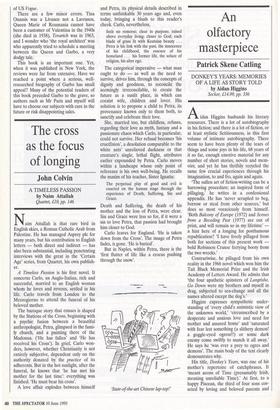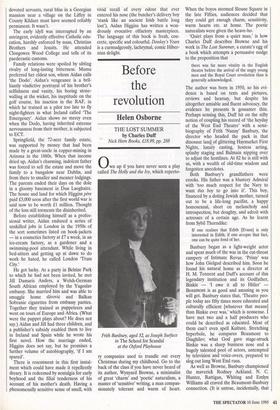An olfactory masterpiece
Patrick Skene Catling
DONKEY'S YEARS: MEMORIES OF A LIFE AS STORY TOLD by Aldan Higgins Secker, £14.99, pp. 336 Aidan Higgins husbands his literary resources. There is a lot of autobiography in his fiction; and there is a lot of fiction, or at least stylistic fictitiousness, in this first volume of intimate autobiography. There seem to have been plenty of the tears of things and some joys in his life, 68 years of it so far, enough emotive material for any number of short stories, novels and mem- oirs; and yet he has thriftily recycled the same few crucial experiences through his imagination, to and fro, again and again.
'The sullen art of fiction-writing can be a harrowing procedure; an inspired form of pillaging,' he writes in a confessional appendix. He has 'never scrupled to beg, borrow or steal from other sources,' but does so most voraciously from himself. 'Both Balcony of Europe (1972) and Scenes from a Receding Past (1977) are out of print, and will remain so in my lifetime' — a hint here of a longing for posthumous republication? 'I have freely pillaged from both for sections of this present work — bold Robinson Crusoe ferrying booty from the two wrecks.'
Contrariwise, he pillaged from his own reality in the 1966 novel which won him the Tait Black Memorial Prize and the Irish Academy of Letters Award. He admits that 'the four apathetic spinsters of Langrishe, Go Down were my brothers and myself in drag, subjected to sea-change and all the names altered except the dog's.'
Higgins expresses sympathetic under- standing of 'every child's animistic view of the unknown world,' circumscribed by a desperate and anxious love and need for mother and assured home' and 'saturated with fear lest something (a slithery demon! a goggle-eyed ogress!!) or some dark enemy come swiftly to snatch it all away.' He says he 'was ever a prey to ogres and demons'. The main body of the text clearly demonstrates why.
His title, Donkey's Years, was one of his mother's repertoire of catchphrases. It 'meant aeons of Time (presumably Irish, meaning unreliable Time).' At first, to a happy Piscean, the third of four sons cos- seted by loving and beloved parents and devoted servants, rural bliss in a Georgian mansion near a village on the Liffey in County Kildare must have seemed reliably permanent. It wasn't.
The early idyll was interrupted by an astringent, evidently effective Catholic edu- cation, harshly enforced by nuns, Christian Brothers and Jesuits. He attended Clongowes Wood College and tells of its paederastic customs.
Family relations were spoiled by sibling rivalry of long-lasting bitterness. Mumu preferred her eldest son, whom Aidan calls 'the Dodo'. Aidan's vengeance is a bril- liantly vindictive portrayal of his brother's selfishness and vanity, his boring stone- walling at the wicket, his ineptitude on the golf course, his inaction in the RAF, in which he trained as a pilot too late to fly night-fighters in what Ireland called The Emergency'. Aidan shows no mercy even when the Dodo, having inherited extreme nervousness from their mother, is subjected to ECT.
Springfield, the 72-acre family estate, was supported by money that had been made by a great-uncle in copper-mining .m Arizona in the 1860s. When that income dried up, Aidan's charming, indolent father was forced to sell the estate and move the family to a bungalow near Dublin, and from there to smaller and meaner lodgings. The parents ended their days on the dole in a gloomy basement in Dun Laoghaire. The house and land for which Higgins pere paid £3,000 soon after the first world war is said now to be worth £1 million. Thought of the loss still torments the disinherited.
Before establishing himself as a profes- sional writer, Aldan endured a series of unskilled jobs in London in the 1950s of the sort sometimes listed on book-jackets — in a cosmetics factory at £7 a week, in an ice-cream factory, as a gardener and a swimming-pool attendant. While living in bed-sitters and getting up at dawn to do work he hated, he called London 'Truss City.'
He got lucky. At a party in Belsize Park to which he had not been invited, he met Jill Damaris Anders, a Welsh-German South African employed by the Yugoslav embassy. She married him and was able to smuggle home slivovic and Balkan Sobranie cigarettes from embassy parties. Together they trained as puppeteers and went on tours of Europe and Africa. (What were the puppet plays about? He does not say.) Aidan and Jill had three children, and a publisher's subsidy enabled them to live in Ireland and Spain while he wrote his first novel. How the marriage ended, Higgins does not say, but he promises a further volume of autobiography, 'if I am spared'.
There is resentment in this first instal- ment which could have made it repellently dreary. It is redeemed by nostalgia for early boyhood and the filial tenderness of his account of his mother's death. Having a phenomenally sensitive sense of smell, with vivid recall of every odour that ever entered his nose (the butcher's delivery boy 'stank like an ancient Irish battle long lost'), Aidan Higgins has written a won- drously evocative olfactory masterpiece. The language of this book is fresh, con- crete, specific and colourful. Donkey's Years is a curmudgeonly, lachrymal, comic Hiber- nian delight.



































































 Previous page
Previous page